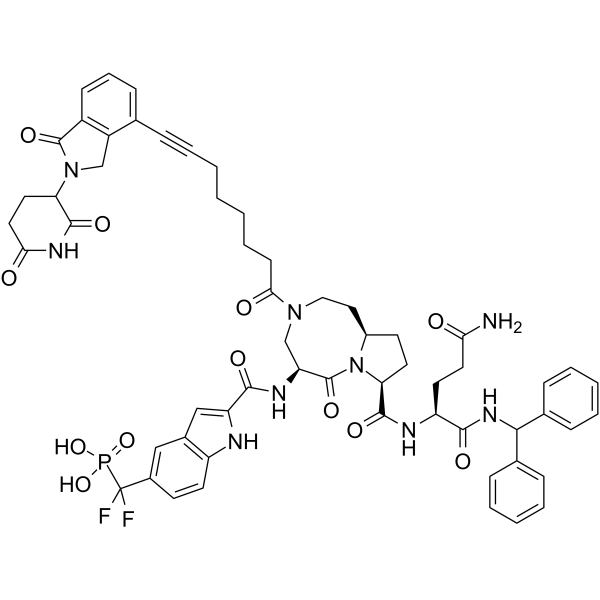
SD-36 is a potent STAT3 PROTAC degradation agent (Kd=~50 nM) with a high selectivity compared to other STAT members. SD-36 also effectively degrades mutated STAT3 proteins in cells and suppresses the transcriptional activity of STAT3 (IC50=10 nM). Induction of STAT3 degradation resulted in strong inhibition of its transcriptional network in leukemia and lymphoma cells. SD-36 inhibited the growth of a subset of acute myeloid leukemia and anaplastic large cell lymphoma cell lines by inducing cell cycle arrest and/or apoptosis. SD-36 achieved complete and durable tumor regression in multiple xenograft mouse models with well-tolerated dosing schedules. SD-36 is composed of the STAT3 inhibitor SI-109, a linker, and an analog of Cereblon ligand Lenalidomide for E3 ubiquitin ligase.
| Molecular Weight | 1158.15 |
| Formula | C59H62F2N9O12P |
| CAS Number | 2429877-44-9 |
| Solubility (25°C) | DMSO ≥ 100 mg/mL |
| Storage | -20°C, sealed |
| Species | Mouse | Rat | Rabbit | Guinea pig | Hamster | Dog |
| Weight (kg) | 0.02 | 0.15 | 1.8 | 0.4 | 0.08 | 10 |
| Body Surface Area (m2) | 0.007 | 0.025 | 0.15 | 0.05 | 0.02 | 0.5 |
| Km factor | 3 | 6 | 12 | 8 | 5 | 20 |
| Animal A (mg/kg) = Animal B (mg/kg) multiplied by | Animal B Km |
| Animal A Km |
For example, to modify the dose of Compound A used for a mouse (20 mg/kg) to a dose based on the BSA for a rat, multiply 20 mg/kg by the Km factor for a mouse and then divide by the Km factor for a rat. This calculation results in a rat equivalent dose for Compound A of 10 mg/kg.
| Related PROTAC Products |
|---|
| DGY-09-192
DGY-09-192 is a bivalent degrader that couples the pan-FGFR inhibitor BGJ398 to the CRL2VHL E3 ligase-recruiting ligand, which induces degradation of FGFR1/2 and largely avoids degradation of FGFR3/4.DGY-09-192 exhibits a nanomolar DC50 against both wild-type FGFR2 and several FGFR2 fusions. In addition, DGY-09-192 has antiproliferative activity in gastric and cholangiocarcinoma cells. |
| BTX-6654
BTX-6654 is a targeted and specific cerebellar-based bifunctional SOS1 PROTAC degrader.BTX-6654 reduces the downstream signaling markers pERK and pS6 and displays antiproliferative activity in a wide range of KRAS-mutant cells. |
| ND1-YL2
ND1-YL2 is a PROTAC that selectively degrades SRC-1 via the N-degron pathway. |
| PRT3789
PRT3789 is a PROTAC degrader targeting SMARCA2 with more than 1,000-fold selectivity for SMARCA2 compared to SMARCA4 at the cellular level for studies related to non-small cell lung cancer (NSCLC). |
| KT-294
KT-294 is a potential first-in-class, PROTAC protein degrader targeting TYK2 for research related to immune system diseases. |


Products are for research use only. Not for human use. We do not sell to patients.
© Copyright 2010-2023 AbMole BioScience. All Rights Reserved.
